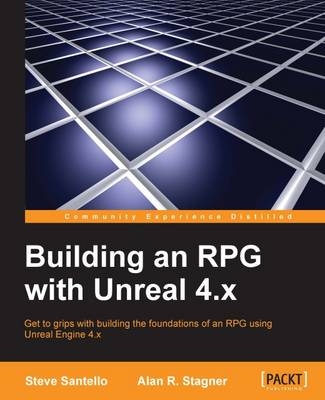
Building an RPG with Unreal 4.x
Packt Publishing Limited (Verlag)
978-1-78217-563-6 (ISBN)
About This Book
• Utilize a mixture of C++, Blueprints, and UMG to create a role playing game (RPG) efficiently
• Create reusable code chunks and elements that can easily be integrated into other games
• A cost effective, step-by-step guide to building and customizing an entire framework for your RPG
Who This Book Is For
If you are new to Unreal Engine and always wanted to script an RPG, you are this book's target reader. The lessons assume you understand the conventions of RPG games and have some awareness of the basics of using the Unreal editor to build levels.
What You Will Learn
• Program gameplay elements in C++ in Unreal
• Create custom game data for entities such as players and enemies
• Create a turn-based combat engine
• Design menu systems and blueprint logic
• Create an NPC and dialog system
• Integrate equipment and items
• Develop the foundations of a saving and loading system
In Detail
Now that Unreal Engine 4 has become one of the most cutting edge game engines in the world, developers are looking for the best ways of creating games of any genre in the engine. This book will lay out the foundation of creating a turn-based RPG in Unreal Engine 4.12.
The book starts by walking you through creating a turn-based battle system that can hold commands for party members and enemies. You'll get your hands dirty by creating NPCs such as shop owners, and important mechanics, that make up every RPG such as a currency system, inventory, dialogue, and character statistics. Although this book specifically focuses on the creation of a turn-based RPG, there are a variety of topics that can be utilized when creating many other types of genres.
By the end of the book, you will be able to build upon core RPG framework elements to create your own game experience.
Style and approach
You will follow a series of lessons detailing the elements that contribute to an RPG. By the end of the book, you will have considerably leveled up your ability to make your own game
Steve Santello is a well-seasoned educator and veteran of the game industry from Chicago, Illinois, USA. His cross-disciplinary study in art, design, programming, and project management has allowed him to explore every facet of game development. As an educator, he has used his passion to teach others about game development, and has populated the game industry with many talented developers over the years. He has worked on over 10 different titles as a 2D and 3D artist for the Chicago game developer Babaroga. With Babaroga, he worked as one of the four artists on many mobile titles published by EA such as Spore Origins, The Godfather Game, and Pictionary: The Game of Quick Draw. He also worked on many mobile titles published by Disney Interactive, such as Hannah Montana In Action and Meet the Robinsons. He and his development team also developed a number of original IPs such as Babaroga Eats Children and BEES!. Since 2006, Steve has also been a university professor. He helped pioneer the Digital Entertainment and Game Design program at ITT Technical Institute in St. Rose, LA, and also the Game and Simulation Programming program at DeVry University in Addison, IL. He has also served as an adjunct professor at the Illinois Institute of Art, Chicago, where he taught game prototyping as a team manager and acting producer. On the side, he developed game and simulation prototypes and plans to release his first two independent games, which were developed with Unreal Engine 4 sometime in 2015. He has writing contributions in Game Development Essentials: Game Interface Design 2nd Edition, Kevin Saunders and Jeannie Novak, Delmar Cengage Learning. In that book, he wrote about the past, present, and future of the user interface in games, which included breaking down the HUD in games such as Deadspace, and talked about how he and his team designed the user interface in Spore Origins. Steve is currently working towards tenure as a CIS gaming instructor at the College of DuPage in Glen Ellyn, Illinois, USA. Although he is very proud of his success, he knows that all his combined experiences have played a major role in where he resides today. Alan R. Stagner is an independent developer. He was introduced to programming by his father; he sought out different ways to create games in a variety of languages. Most recently, he found the Unity game engine and was instantly hooked, and discovered his love of multiplayer game development. He has also dabbled in database and server programming from time to time, mostly involving PHP and MySQL, with recent forays into ASP.NET.
| Erscheinungsdatum | 05.02.2016 |
|---|---|
| Verlagsort | Birmingham |
| Sprache | englisch |
| Maße | 75 x 93 mm |
| Themenwelt | Mathematik / Informatik ► Informatik ► Programmiersprachen / -werkzeuge |
| Informatik ► Software Entwicklung ► Spieleprogrammierung | |
| ISBN-10 | 1-78217-563-6 / 1782175636 |
| ISBN-13 | 978-1-78217-563-6 / 9781782175636 |
| Zustand | Neuware |
| Haben Sie eine Frage zum Produkt? |
aus dem Bereich


